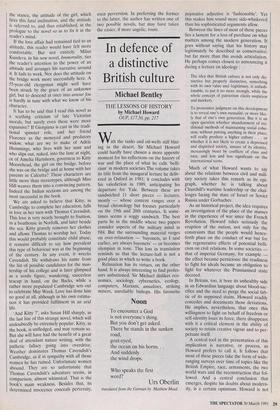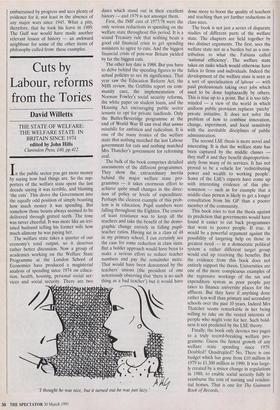In defence of a distinctive British culture
Michael Bentley
THE LESSONS OF HISTORY by Michael Howard OUP, £17.50, pp. 217 With the tanks and oil-wells still blaz- ing in the desert, Sir Michael Howard could hardly have chosen a more apposite moment for his reflections on the history of war and the place of what he calls `belli- cism' in modern societies.The volume takes its title from the inaugural lecture he deliv- ered in Oxford in 1981; it concludes with his valediction in 1989, anticipating his departure for Yale. Between these are sandwiched 11 short pieces — lectures, mostly — whose content ranges over a broad chronology but focuses particularly on the 19th and 20th centuries. It some- times seems a soggy sandwich. The best parts lie in the middle where two papers consider aspects of the military mind in 1914. But the surrounding material verges on over-relaxation — 'bayonets, as I said earlier, are always bayonets' — or becomes olympian in tone. This loss in translation reminds us that the lecture-hall is not a good place in which to write a book.
Relaxation has its virtues, on the other hand. It is always interesting to find profes- sors unbuttoned. Sir Michael dislikes eco- nomics, sociology, cybernetics, ecology, computers, Marxists, annalistes, striking miners, unreliable bishops. His favourite
pejorative adjective is 'fashionable'. Yet this makes him sound more side-whiskered than his sophisticated arguments allow.
Between the lines of most of these pieces lies a lament for a loss of purchase on what matters among the modern generation. It goes without saying that his history may legitimately be described as conservative; but far more than this avoids articulation. He perhaps comes closest to announcing it during a lecture on ideology :
The idea that British culture is not only dis- tinctive but properly distinctive, something with its own value and legitimacy, is unfash- ionable, to put it no more strongly, while the whole concept of patriotism elicits suspicion and mockery.
To pronounce judgment on this development is to reveal one's own mentalite, or more like- ly that of one's own generation. But it is an open question whether abandonment of tra- ditional methods of maintaining social cohe- sion, without putting anything in their place, will really produce a higher culture . . . or whether it is not likely to create a depressed and dispirited society, unsure of its identity, increasingly beset by conflicts of class and race, and less and less significant on the international scene.
Much of what Howard wants to say about the relations between civil and mili- tary society takes this remark as its epi- graph, whether he is talking about Churchill's wartime leadership or the chal- lenges facing the state of Israel or Soviet Russia under Gorbachev.
As an historical project, the idea requires an investigation of the place of the masses in the experience of war since the French Revolution. Howard takes seriously the eruption of the nation, not only for the constraints that the people would hence- forth place on the conduct of war but for the regenerative effects of potential belli- cism on civil relations. In some societies that of imperial Germany, for example the effect became pernicious: the readiness to fight for ideals became an obligation to fight for whatever the Prussianised state decreed.
In Britain, too, it bore its unhealthy side in an Edwardian language about blood-sac- rifice and the need to purge the social fab- ric of its supposed stains. Howard readily concedes and documents those deviations. He implies, nevertheless, that once this willingness to fight on behalf of freedom or self-identity loses its force, there disappears with it a critical element in the ability of society to retain creative vigour and to per- petuate itself.
A central tool in the presentation of this implication is narrative, or process, as Howard prefers to call it. It follows that most of these pieces take the form of wide- ranging surveys over time of topics like the British Empire, race, armaments, the two world wars and the reconstruction that fol- lowed. And a central conclusion that emerges, despite his doubts about modern- ity, is a certain optimism. Howard is not embarrassed by progress and sees plenty of evidence for it, not least in the absence of any major wars since 1945. What a pity, therefore, that he took his leave in 1989. The Gulf war would have made another relevant lesson of history — an awkward neighbour for some of the other items of philosophy culled from these examples.



















































 Previous page
Previous page